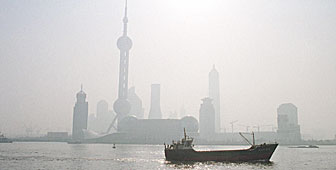
Swiss Re has high hopes for China

Swiss Re is gearing up to expand its activities in China, the world's fastest growing insurance market.
The world’s second largest reinsurer has received approval from the Chinese authorities to prepare for branch operations – a first step toward offering property, casualty and life reinsurance services in China.
“With China’s entry into the World Trade Organisation (WTO) and a significant amount of foreign direct investment coming into China, we think the long term potential of this market from an insurance perspective is very large,” Pierre Ozendo, Chief Executive of Swiss Re’s Asia Division, told swissinfo.
Healthy growth
The market for life and property and casualty insurance in China, which has a GDP per head of $4,000 (SFr5,772), has grown by 20 per cent a year in the past decade.
“We and other professional reinsurers are paying a lot of attention to the Chinese marketplace. We expect to have good, stiff competition there,” Ozendo said.
According to Ma Mingzhe, head of China’s second-largest insurer Ping’an, the volume of policies in China in the damage insurance business alone will, by 2005, be greater than that of Britain, France and Germany combined.
He also believes that growth rates in the insurance business will be higher than in any other sector in China and that they can be sustained for the next 15 to 20 years.
And China – with a population of over 1.25 billion and GDP growth from 1999 to 2001 outpacing that of all other emerging economies – has seen its citizens become increasingly interested in life insurance, according to analysts.
Insurance licenses
Until now Swiss Re has not been able to underwrite policies in Renminbi, the Chinese currency, which severely limits its ability to do business in China.
“The approval of the license will give us the opportunity to have a permanent establishment in China. It will allow us to do the full gamut of underwriting for the Chinese market,” Ozendo said.
According to swissinfo correspondent Georges Baumgartner, Swiss companies such as Swiss Re, Zurich Financial Services and Winterthur seem to find more favour in Beijing than their European or United States rivals.
“Certainly, China is opening its market to Swiss Re and others”, said an analyst from the investment bank UBS Warburg in Hong Kong. “But China has always managed to protect the interests of its own insurance companies up until now.”
He added that foreign companies that are making any money in China are still rare.
Swiss Re, which opened representative offices in Beijing and Shanghai in 1996 and 1997, is now busy preparing a business plan, which it will submit to the Chinese authorities in hopes of winning a license.
“We are extremely pleased and proud to receive authorisation to plan for a national reinsurance license in China,” Ozendo said.
Insurance licenses were one of the most controversial issues in China’s accession to the WTO, sparking a row between the US and the European Union, which threatened to derail the final accords.
Depressed profits
Swiss Re – hit hard by the September 11 terrorist attacks – said that profits for the first half of 2002 would be depressed by the global downturn in financial markets.
Swiss Re also said demand for reinsurance should stay strong for the next two to three years as falling stock prices highlighted the need for cover.
The company expects exposure from the September 11 attacks to reach about SFr3 billion ($2.05 billion) – the main reason for Swiss Re’s 2001 net loss of SFr165 million, according to a statement.
Swiss Re is currently battling it out with the leaseholder of the World Trade Center, Larry Silverstein, over whether the terrorist attacks on the twin towers constitute one or two events.
Reinsurers have seen demand rise since the attacks enabling them to charge higher premiums from their clients, the primary insurers.
by Karin Kamp

In compliance with the JTI standards
More: SWI swissinfo.ch certified by the Journalism Trust Initiative



























You can find an overview of ongoing debates with our journalists here . Please join us!
If you want to start a conversation about a topic raised in this article or want to report factual errors, email us at english@swissinfo.ch.